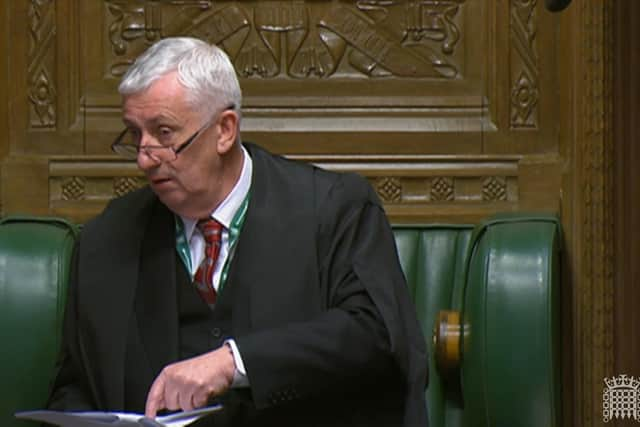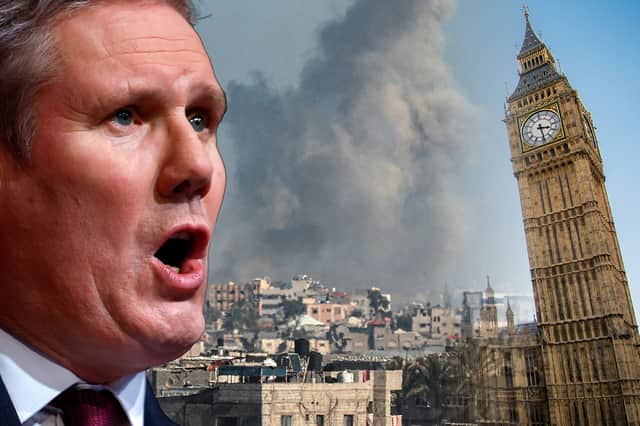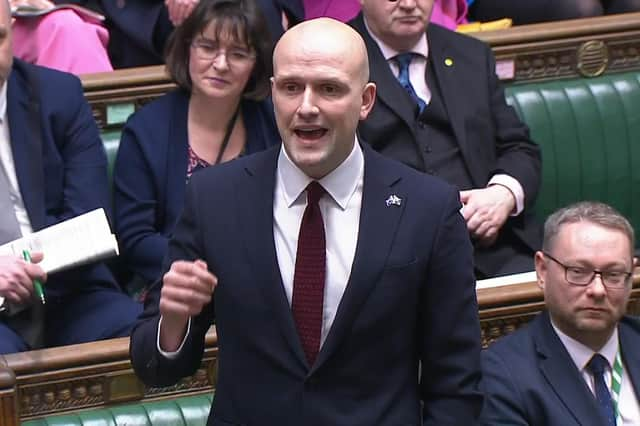What happened in the House of Commons yesterday? Controversy over Speaker Lindsay Hoyle leaves Gaza vote chaos
and live on Freeview channel 276
The House of Commons has descended into chaos during a vote over a ceasefire in Gaza.
Labour's amendment, which called for an "immediate humanitarian ceasefire", was eventually passed but not before MPs voted on whether to sit in private and Scottish National Party and Tory members walked out. Had the House sat in private, with no members of the public or press and no record of what was said, it would have been the first time since 2001.
Advertisement
Hide AdAdvertisement
Hide AdThe mayhem was caused after Conservative and SNP MPs accused the Speaker Lindsay Hoyle of favouring Labour, by selecting Keir Starmer's amendment. SNP leader Stephen Flynn called for an investigation into the debacle, with Hoyle apologising almost in tears
Amid shouts of “resign”, he said: “I thought I was doing the right thing and the best thing, and I regret it, and I apologise for how it’s ended up.”
Hoyle said he took the decision to allow all sides to “express their views” and that he was “very, very concerned about the security of all members”. Hoyle expressed regret that SNP MPs were ultimately unable to vote on their proposition.


Gaza ceasefire vote called by SNP
The votes were initially triggered by the Scottish National Party, who used an opposition day debate in the House of Commons to put forward a motion on the Israel-Palestine conflict. The SNP amendment, which called for "an immediate ceasefire in Gaza and Israel ... and an end to the collective punishment of the Palestinian people", had been designed to put pressure on Labour and Keir Starmer.
Advertisement
Hide AdAdvertisement
Hide AdThe last time there was a vote on a ceasefire in November 2023, 56 Labour MPs rebelled with 10 frontbenchers quitting, including Jess Phillips. At the time, Labour was calling for "humanitarian pauses" instead of a "ceasefire", however now Starmer has changed his language. Labour put forward an amendment which calls for a "immediate humanitarian ceasefire ... noting that Israel cannot be expected to cease fighting if Hamas continues with violence".


Following the Labour motion, the government put forward its own amendment which urged an "immediate humanitarian pause" which "supports moves towards a permanent sustainable ceasefire".
The 7 October attack by Hamas on Israel saw around 1,400 Israelis killed and hundreds taken hostage in the deadliest attack on Jews since the Holocaust. The Gaza health ministry says that more than 29,000 Palestinians have been killed by Israeli assaults, while the IDF is preparing for an offensive on Rafah, where more than a million Palestinians are seeking refuge. Ramping up the pressure further, protesters amassed in Westminster outside the Houses of Parliament.
Why was there chaos in the House of Commons?
Beyond the wider controversy and polarisation of the Israeli-Palestinian conflict, voting on the amendments has been controversial due to Parliamentary procedure. Normally during an opposition day debate, MPs get the chance to vote on two amendments.
Advertisement
Hide AdAdvertisement
Hide AdAs this was an SNP opposition day debate, this would normally be a motion from the nationalists and one other motion, often put forward by the government. However, in this case, Speaker of the House of Commons Lindsay Hoyle took the almost unprecedented step of selecting three amendments, including Labour's.
Hoyle said he took the decision in order to give MPs the “widest possible range” of options in the Gaza ceasefire debate because of its importance. He told the Commons: “This is a highly sensitive subject on which feelings are running high, in the House, in the nation, and throughout the world. I think it is important on this occasion that the House is able to consider the widest possible range of options.”
Hoyle had disregarded warnings from the House of Commons Clerk over the unprecedented nature of the move, which provoked uproar in the chamber.
This led to the SNP shout "shame on you!” at the Speaker, while Tory party chairman Richard Holden could be seen shout “shameful!” Another Conservative MP, Desmond Swayne, yelled: "Bring back [former speaker John] Bercow."


What happened in the House of Commons yesterday?
Advertisement
Hide AdAdvertisement
Hide AdBefore the votes, the government pulled its motion, which left the Labour amendment and SNP amendment to be voted up. But as the SNP supported Labour's wording for a ceasefire, Starmer's amendment was passed and their could be no vote for the nationalists.
Prior to that, MPs had voted on whether to sit in private in protest against the Speaker. Only 10 MPs voted in favour of this, while 210 voted against it. This only added to the bizarre nature of the event.
SNP Westminster leader Flynn said he would take significant convincing that the Speaker’s position was “not now intolerable” and claimed his party had been treated with “complete and utter contempt”.
He told the PA news agency he was disappointed that a “pantomime” in the Commons “is detracting” from the crisis in Gaza. Flynn also called for an investigation as he appeared to suggest Starmer and Labour chief whip Alan Campbell exerted pressure on the Speaker ahead of his decision to pick Labour’s amendment.
Advertisement
Hide AdAdvertisement
Hide AdDeputy Speaker, Dame Rosie Winterton denied that Hoyle had been influenced by Labour. Hoyle told the Commons: “I have never met with Sue Gray today, I didn’t bump into her today. I am offended by that comment.”
While Conservative former ministers called for the vote to be run again. Kit Malthouse said: "You seem to have rammed through two divisions that were quite important to quite a lot of Members, in which no individual vote will have been recorded."
It is highly unusual for the Speaker of the House of Commons to allow votes on three amendments on an opposition day debate. However, I would have more sympathy with SNP complaints, if they hadn't put forward this motion purely to pile pressure on Labour and Keir Starmer.
Following the vote on a ceasefire in November, this is not the first amendment of this kind the SNP has brought, Labour MPs reported getting death threats and abuse for voting with their party. It is understood representations were made to Hoyle, with concern about this happening again unless they were given the opportunity to vote for their own party's ceasefire amendment.
These votes will have no impact on government policy on Israel or Gaza, or the actual war unfolding. Let's not forget the SNP themselves made this opposition day debate about Labour, when they put forward the motion to put pressure on Starmer. Ultimately all MPs are responsible for the unsightly scenes we saw in the Commons.
How did my MP vote on the Labour amendment on a ceasefire in Gaza?
Due to the other motions being pulled, the Labour amendment was passed without MPs having to vote.
The Labour amendment states: "An Israeli ground offensive in Rafah risks catastrophic humanitarian consequences and therefore must not take place; notes the intolerable loss of Palestinian life, the majority being women and children; condemns the terrorism of Hamas who continue to hold hostages."
Advertisement
Hide AdAdvertisement
Hide AdThe amendment "supports Australia, Canada and New Zealand’s calls for Hamas to release and return all hostages and for an immediate humanitarian ceasefire, which means an immediate stop to the fighting and a ceasefire that lasts and is observed by all sides, noting that Israel cannot be expected to cease fighting if Hamas continues with violence".
What happens now?
It's pretty clear that Hoyle is fighting to save his job. He was a Labour MP prior to becoming Speaker, but has to renounce his party to take up the apolitical position. Now Hoyle is facing accusations he favoured his old party.
Commons Leader Penny Mordaunt launched a bitter attack on Hoyle, claiming he had “hijacked” the debate and “undermined the confidence” of the House in its long-standing rules. While more than 30 MPs have signed a parliamentary motion tabled by a Tory MP declaring no confidence in the Speaker. Should a no confidence vote happen, if the government decided to whip its MPs against Hoyle he would likely be removed.
Ralph Blackburn is NationalWorld’s politics editor based in Westminster, where he gets special access to Parliament, MPs and government briefings. If you liked this article you can follow Ralph on X (Twitter) here and sign up to his free weekly newsletter Politics Uncovered, which brings you the latest analysis and gossip from Westminster every Sunday morning.
Comment Guidelines
National World encourages reader discussion on our stories. User feedback, insights and back-and-forth exchanges add a rich layer of context to reporting. Please review our Community Guidelines before commenting.
